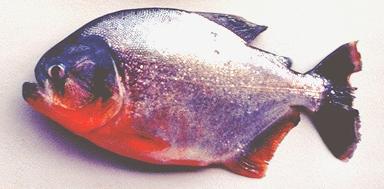
Copeia 1993(4):665-687
William L. Fink
Relative to other serrasalmins, Pygocentrus is diagnosable by
several features, including prepelvic serrae number, morphology
of the gas bladder and skull, and head width. There are three
species in the genus: P. piraya, P. nattereri, and P. cariba.
P. piraya is diagnosed by presence of adipose fin rays; it is
restricted to the Rio Sao Francisco of Brazil. P. nattereri is
undiagnosed, and highly variable in pigmentation. Its included
populations are found in tropical and subtropical South America,
east of the Andes, including the Amazon basin, the
Paraguay/Paran system, and the rivers of the Guianas and
northeast Brazil. P. cariba is diagnosed by presence of four
supraneurals and a dark, prominent humeral blotch; it ranges
through the R¡o Orinoco and its tributaries in Colombia and
Venezuela. A key to the species is provided. All extant types
or members of type series are illustrated. Morphometric analyses
found no significant shape differences among the species; body
shape is extremely stable both ontogenetically as well as within
populations. In contrast, color pattern in both preserved
specimens and in life is highly variable ontogenetically and
within populations.
